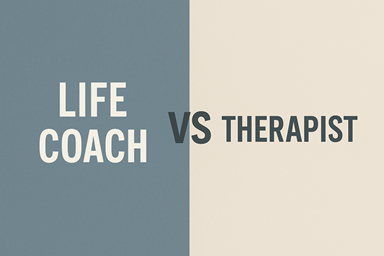When you’re facing personal struggles, emotional challenges, or simply seeking growth, the question of whether to see a life coach or a therapist often arises. Both life coaches and therapists offer valuable services that can help individuals improve their lives, but they do so in different ways. In this article, we’ll explore the key differences between a life coach and a therapist, and help you understand which professional may be the right choice for your needs.
What is a Life Coach?
A life coach is a professional who works with clients to achieve specific goals, overcome obstacles, and make positive changes in their lives. Life coaches often focus on helping individuals improve their personal or professional lives, which might include enhancing their career, relationships, health, or overall well-being. Life coaching is forward-focused, focusing on future goals rather than delving deeply into past issues.
A life coach helps clients develop a plan of action to achieve their desired outcomes. They assist in building confidence, establishing healthier habits, and creating strategies for success. Life coaches are not required to have specific credentials, but many undergo training in coaching methods and have certifications from reputable organizations.
What is a Therapist?
On the other hand, a therapist, or licensed mental health professional, is trained to diagnose and treat emotional, psychological, and mental health conditions. Therapists include psychologists, licensed counselors, social workers, and marriage and family therapists. They typically use talk therapy to help individuals work through mental health issues such as anxiety, depression, trauma, and grief.
Therapists are licensed professionals who are required to have specific education and clinical experience, often holding advanced degrees and licenses in their field. They are trained to provide therapy that can address past trauma, mental health challenges, and emotional distress.
Life Coach vs Therapist: What’s the Difference?
The primary difference between a life coach and a therapist lies in their approach to helping clients. Here’s a breakdown of how they differ:
- Focus and Approach
- Therapists focus on mental health, helping individuals address deep-rooted emotional and psychological issues. They use a range of therapeutic techniques to help clients overcome trauma, mental illness, and emotional challenges. Therapy is often centered around the past, understanding the roots of a person’s issues, and healing.
- Life coaches, in contrast, focus on achieving specific goals, personal growth, and future planning. They are not typically concerned with diagnosing or treating mental health disorders, but rather helping clients improve their lives by creating actionable plans and holding them accountable.
- Therapists focus on mental health, helping individuals address deep-rooted emotional and psychological issues. They use a range of therapeutic techniques to help clients overcome trauma, mental illness, and emotional challenges. Therapy is often centered around the past, understanding the roots of a person’s issues, and healing.
- Training and Credentials
- Therapists are required to have formal education and licenses. For instance, they may hold a Master’s or Doctorate in psychology or counseling and must be licensed to practice in their state or country. Their work is regulated by professional boards, and they are required to follow strict ethical guidelines.
- Life coaches do not require specific degrees or licenses, but they often pursue specialized coaching programs and certifications. Although life coaching is not as tightly regulated as therapy, many life coaches are trained in areas like goal-setting, personal development, and leadership.
- Therapists are required to have formal education and licenses. For instance, they may hold a Master’s or Doctorate in psychology or counseling and must be licensed to practice in their state or country. Their work is regulated by professional boards, and they are required to follow strict ethical guidelines.
- Scope of Practice
- Therapists are equipped to treat mental health disorders, such as depression, anxiety, and PTSD. They help clients understand and process emotional pain, trauma, and other psychological conditions. Therapy can sometimes involve long-term treatment.
- Life coaches primarily focus on goal-oriented conversations. They help clients with self-improvement, decision-making, and developing the mindset for success. Life coaches do not treat psychological issues but can help clients with specific personal or professional goals.
- Therapists are equipped to treat mental health disorders, such as depression, anxiety, and PTSD. They help clients understand and process emotional pain, trauma, and other psychological conditions. Therapy can sometimes involve long-term treatment.
- Sessions and Techniques
- Therapists use structured therapeutic methods such as Cognitive Behavioral Therapy (CBT), Dialectical Behavioral Therapy (DBT), and talk therapy. These methods aim to address mental health issues and emotional pain.
- Life coaches tend to use strategies like motivational interviewing, positive psychology, and action planning. They help clients define their goals, break them down into manageable steps, and keep clients accountable for progress.
- Therapists use structured therapeutic methods such as Cognitive Behavioral Therapy (CBT), Dialectical Behavioral Therapy (DBT), and talk therapy. These methods aim to address mental health issues and emotional pain.
When to Choose a Therapist
If you’re struggling with mental health issues such as depression, anxiety, trauma, or grief, a therapist is likely your best option. Therapists can provide a safe, confidential space where you can explore your feelings, understand your behaviors, and heal from emotional wounds.
If you need help navigating a mental health diagnosis or want to explore the underlying causes of your emotional challenges, therapy is the recommended route. Therapists work to improve your mental well-being, and if necessary, they can refer you to other medical professionals or prescribe medication if needed.
When to Choose a Life Coach
On the other hand, a life coach may be a great choice if you’re looking to make progress in specific areas of your life, such as improving your career, achieving personal goals, or enhancing relationships. Life coaching is perfect for individuals who are in a stable mental state but want help with motivation, setting goals, or breaking through personal barriers.
If you are not struggling with a mental health condition but are looking for ways to improve your life, enhance productivity, or gain clarity about your direction, a life coach can help you gain the insights and skills needed to achieve your personal or professional goals.
Life Coaching vs Therapy: Which Is Right for You?
Choosing between a life coach and a therapist depends largely on your personal needs. Here are some guiding questions to help you decide:
- Are you struggling with emotional or psychological distress? If yes, a therapist would be the right choice.
- Are you looking to make progress in your personal or professional life, set goals, and build habits? A life coach may be the ideal fit.
- Do you want to explore past trauma or mental health issues? Consider working with a therapist.
- Are you looking for a supportive professional to guide you towards your future goals? A life coach may be able to assist you.
“The future belongs to those who believe in the beauty of their dreams.” – Eleanor Roosevelt
Life Coaches at LifeCoachUp: Find Your Ideal Coach
If you’re ready to take your personal growth or professional development to the next level, LifeCoachUp provides an excellent platform where you can list your profile as a life coach or find a certified life coach near you. Whether you’re a coach looking to expand your client base or someone looking for expert coaching, LifeCoachUp is the place to connect with professionals who can help you navigate life’s challenges and achieve your dreams.
At LifeCoachUp, we make it easier to find a certified life coach who aligns with your needs. We encourage all life coaches to join our platform and create a profile that highlights their expertise. With the right coach by your side, you can take actionable steps towards a better future, equipped with the tools, motivation, and guidance you need.


